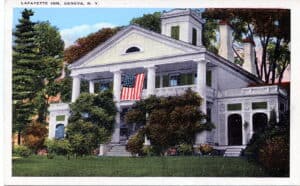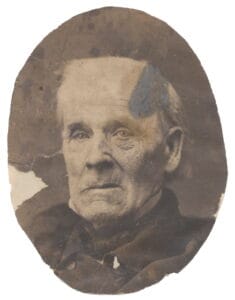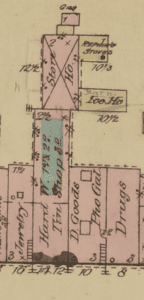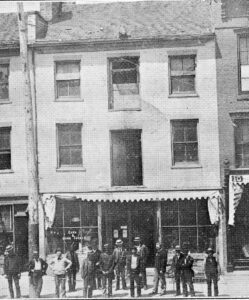Phineas Prouty Sr and His Family Legacy Part I
By Anne Dealy, Director of Education and Public Information
There are many Geneva families we can tell stories of. One of the families the staff thinks about a lot is the Prouty family. Most of us spend every working day in the building that was their home for nearly 50 years. So what’s the Prouty story?
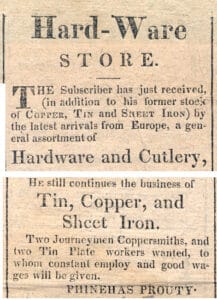
By the 1820s Prouty had a hardware store on Seneca Street dealing in all sorts of items useful in a growing commercial and agricultural center.
Born in New Hampshire in 1788, Phineas1 Prouty grew up in Newport, Vermont. As a young man he moved west, settling first in Schenectady, where his older brother had a hardware business. Around this time, he also served in the War of 1812, possibly receiving land as payment for services.2 Prouty came to Geneva by 1815, opening a copper, tin, and sheet iron factory. This was before the Erie Canal was built, so according to E. Thayles Emmons’ Story of Geneva, he brought goods for his business by portage and the existing rivers and lakes from Schenectady. By 1817, he was operating a hardware store that offered “Bake, Box, Franklin and Sheet Iron Stoves; Stove Pipes; Stills; Steamers and Still Worms; Saw and Grist Mill Irons; Joiners’ and Carpenters’ Tools; Albany Air Furnace Caldron and Potash Kettels [sic],” all items that were useful in a growing agricultural and commercial center where the primary exports were whiskey and potash. By 1819 he had achieved enough success to marry Martha Matilda Van Vranken of Schenectady and purchase property on Seneca Street for his store and home.

A partial listing of Phineas Prouty’s 14 land purchases between 1819 and 1845 in Ontario County’s Grantee Index.
Phineas Prouty was one of many New England transplants who participated in the civic and political life of the village, serving as village trustee, fire warden, assessor, and sealer of weights and measures. He also saw his share of sorrow, losing his first child to dysentery at a year old and his wife to a sudden illness in 1830. Their two daughters, Sarah and Harriet, and younger son, Phineas Jr., survived to adulthood. His substantial success in business is demonstrated by his prominence in the community and his accumulation of real estate. Like many men in the early decades of the 19th century, he bought and sold quite a bit of property. He purchased 14 pieces of real estate in Ontario County between 1819 and 1845, sometimes providing the financing for the purchaser, including giving John Johnston a $4000 mortgage in 1841 on his purchase of 132 acres in Romulus.
On one of these properties, Prouty built a grand Greek Revival house in 1836, later known as the Lafayette Inn restaurant. The house stood at the corner of Pre-Emption Road and 5 & 20, where the Ponderosa Restaurant is today. He sold it and moved into the house at 543 South Main Street that now houses Historic Geneva’s Geneva History Museum. The house on Pre-Emption passed through several families before being turned into a popular 20th-century restaurant, which burned to the ground in the 1970s.
Beyond the real estate documents and one photograph, we don’t know much about Phineas Prouty Sr. According to Emmons, he gave houses to both his daughters on South Main Street. Harriet married first, from the house on Pre-Emption, to Thomas Hillhouse of Albany. They resided in Geneva for a number of years in a house at 775 South Main. Sarah and her husband Alex Chew lived briefly at 543 South Main, before moving to 600 South Main, now Kappa Alpha. Phineas’ son, Phineas Jr., married Adelaide Cobleigh, and they lived with Mr. Prouty at 543 South Main. Adelaide periodically writes about her father-in-law in her diary. As his son had taken over the hardware business, Phineas Sr. spent time at home with her many days. She writes that he was beloved by his granddaughters and rode them around the house on his shoulders. In March 1862, he died of what sounds like a stroke. None of the extant newspapers have an obituary for him, perhaps because war news had taken over the publications.
Just a year before his father’s death, his son considered the loss of many of the men he knew in Geneva. His words will resonate with anyone old enough to remember the elders in their own pasts:
Its [sic] sorrowful to see the old citizens passing away. Their familiar faces are no longer seen in the streets & strange ones take their places. Faces that we have known since childhood we look up to & upon them as one of the “institutions.” But they are dropping off one by one & our impressions & feelings towards our place–Geneva–change with there [sic] changes & we feel the flights of time more–for our Geneva is associated with the old men of Geneva & when these pass away it seems strange & unfamiliar & the fact quickens the consciousness the [sic] we too are growing old.
Next time we will look at the equally successful trajectory of Phineas Prouty Jr. and how the family’s material success did not guarantee happy endings for all its members.
Footnotes
[1] Documents show both Phineas Prouty Sr. and Jr.’s names both with and without a second “h”. I have elected to spell their names without the “h”.
[2] This is stated in E. Thayles Emmons’ Story of Geneva, which pulled material from articles published in the Geneva Daily Times in the early decades of the 20th century. I was able to find a payment card for Phineas Prouty in the New York State Archives records of payments to soldiers in the War of 1812, however, I could not find any documentation that Prouty received a land bounty.
Phin and Kit: The Prouty Family Legacy Part II
The Next Generation: The Prouty Family Legacy Part III

